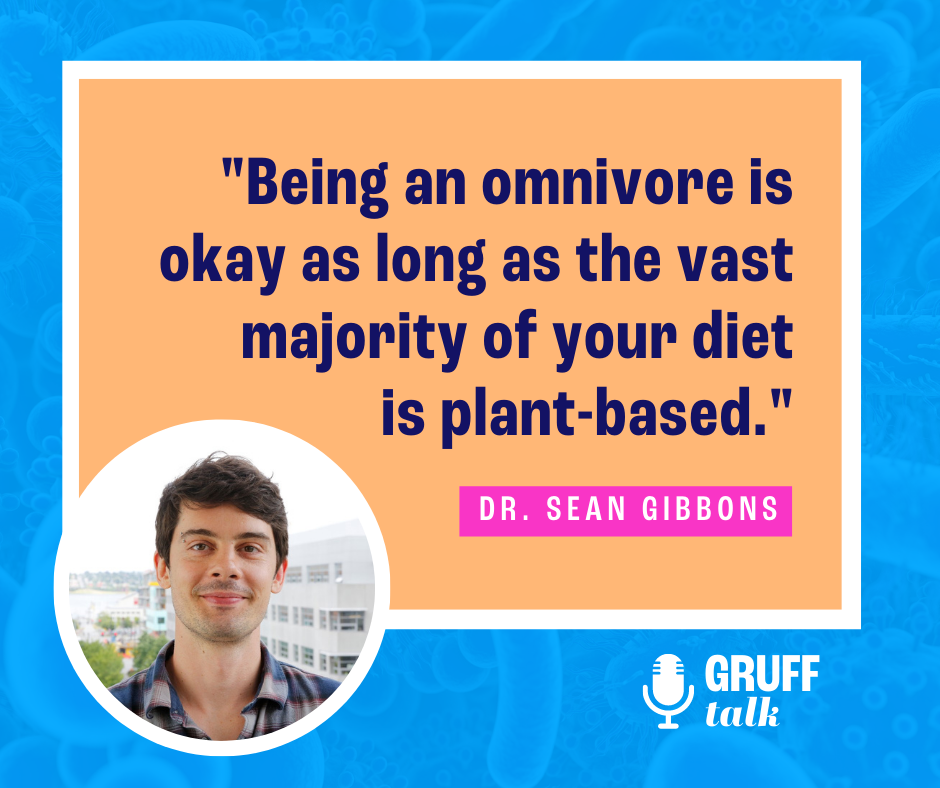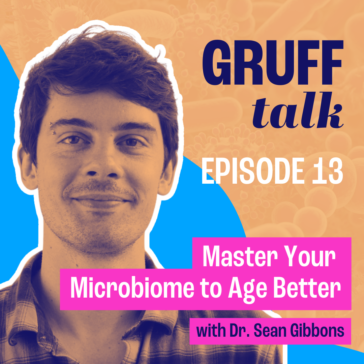Listen to the full discussion here.
Gut health has zoomed in popularity in recent years because everyone wants to have a better understanding of how to get healthy and age better by manipulating the microbiome.
In this week’s podcast, we take a deep dive into the gut microbiome to unpack this complex community of bacteria and thanks to my guest, you will come away with a deep understanding of how it impacts literally every inch of your body . . . head to toe, inside and out.
A Do-Not-Miss Conversation
I was joined by Dr. Sean Gibbons from the Institute for Systems Biology in Seattle, who has been involved in some incredible new research about the gut microbiome’s impact on aging. During our conversation, he shared his specialized knowledge and insights into how the gut microbiome impacts our daily lives, what we can all be doing to take better care of it, and how we can manipulate our microbiomes to age better. It’s a fascinating discussion that will absolutely require your time and attention.
Grab a Glass of Wine and Tune In
As I said in the intro to the episode: “Grab a cup of tea or a glass of wine, curl up in a comfy chair, close your eyes, and tune in.” I promise you will learn so much from this masterclass in how to manipulate your microbiome, and please share on social media so your friends and family can benefit from this information, too. Thank you!
This was such a complicated and rich topic that we created two parts:
Part 1 of this episode offers a GRUFFtalk special ‘Masterclass on Gut Microbiome’ function and connections to overall health, wellbeing, and aging, so you understand what’s really happening.
Part 2 delves into specific questions GRUFFtalk listeners sent to us before we recorded this episode, and Dr. Gibbons answers most of them. However, there were a few questions we simply could not get to during our conversation, but in a follow-up discussion, Dr. Gibbons generously offered his insights and answers, which you can read at the end of this post in the “Bonus Questions” section.

Part 1: The Gut Microbiome Masterclass
Dr. Gibbons explains how we are covered in these tiny microorganisms inside and out, and how we each have over 30 trillion microbiota.
When it comes to aging and the gut microbiome, Dr. Gibbons explained the research and implications of some surprising results that were found in a study of healthy and unhealthy older populations. The most astonishing discovery is how a diverse and unique gut microbiome correlates to healthy aging.
This is a must-listen-to conversation that will help you not only understand what is happening in your gut, but how having a gut microbiome that changes as you get older is the best possible outcome for successful aging.
Lastly, this masterclass wouldn’t be complete without Dr. Gibbons breaking down how microbes affect your immune system and the ways you can fight inflammation (or sometimes embrace it) by manipulating your gut microbiome.
LISTEN TO THE FULL PODCAST BY CLICKING HERE.
Part 2: Listener Questions for Dr. Gibbons:
Listeners of GRUFFtalk sent in some amazing questions for Dr. Gibbons! If you have more questions for Dr. Gibbons or have ideas for future episodes, send an email to grufftalkpodcast@gmail.com.
Here are the questions the GRUFFtalk audience sent in. Listen to Dr. Gibbons’ answers here. Keep scrolling down to see the ‘bonus questions’.
- What things can we do throughout our lifetimes to manipulate our microbiomes?
- Can we positively change the gut microbiome later in life?
- Are probiotic supplements good for you?
- Should we be getting our gut microbiomes tested?
- Which diet is best for your gut? Plant-based? Mediterranean? Carnivore? Omnivore?
- What is the connection between the gut microbiome and disease, specifically cancer?
- Should you be concerned that taking statins for high cholesterol might negatively impact your gut health?
- Does the gut microbiome have any impact on weight loss or gain?
Bonus Questions:
- Is there any way to fix a leaky gut? Gut leakiness is often preceded by chronic inflammation, a reduction in the thickness of the gut mucus layer, and the rise of pro-inflammatory microbes. All of these things can be alleviated by eating a diverse set of fruits and vegetables. Dietary fiber provides more food for your microbes, so they don’t munch as much on your mucus layer. Fiber promotes healthy, strictly-anaerobic bacteria that produce short-chain-fatty-acids, which help to lower inflammation levels.
- Is there a connection between the gut microbiome and asthma? Yes. There are many connections between the gut microbiome and over-active immune systems, both in terms of allergies/asthma and in terms of autoimmune diseases. All of these issues have been shown to be associated with disruptions in the gut microbiome in early life (i.e., when we are infants). There is a critical window when we are very young, where our immune system is being trained to recognize what is ‘dangerous’ and what is ‘safe’. Improper exposure to microbial diversity during this window means that later in life, the immune system is more likely to overreact when exposed to proteins/antigens from food or from microbes. For example, C-section-born infants are more likely to suffer from allergies and asthma than vaginally born infants, likely due to the fact that these kids are exposed to different kinds of microbes in early life: https://link.springer.com/article/10.1186/s13223-015-0102-0
- Does drinking apple cider vinegar help create a healthy gut microbiome? Yes. There have actually been clinical trials showing reductions in cardiometabolic risk factors and inflammation for people taking a daily dose of apple cider vinegar (https://www.ncbi.nlm.nih.gov/pmc/articles/PMC8243436/ ; https://www.sciencedirect.com/science/article/abs/pii/S2405457719301263).
- Are fermented foods essential for a healthy gut microbiome? Yes. Recent work from the Sonnenberg Lab at Stanford has shown that increasing fermented foods in diet reduces inflammation (https://www.cell.com/cell/pdf/S0092-8674(21)00754-6.pdf). Fermented foods often contain organic acids (like acetate, which is the dominant acid in apple cider vinegar). These organic acids are also produced internally by our microbes, as they ferment dietary fibers.
Dr. Gibbons 3 Takeaways for Gut Health and Better Aging:
- Remember that you are not alone, but are comprised of trillions of bacteria and cells, so you need to think about what lifestyle changes will benefit them
- Eat a diverse array of whole foods, mostly plant-based
- Turning back the clock may not be best when it comes to your gut microbiome — we want to see the gut microbiome become more diverse and different from when you were younger
Connect with Dr. Gibbons and get more information about the Institute for Systems Biology:
Website: Gibbons Lab at the Institute for Systems Biology
Twitter: Dr. Sean Gibbons
Book: Love Your Age: The Small-Step Solution to a Better, Longer, Happier Life
Twitter: @BGrufferman
Website: Barbara Hannah Grufferman
Instagram @Barbara Hannah Grufferman
Facebook @BarbaraHannahGruffermanAuthor
Companies referenced during the conversation (note: We are not endorsing these products or companies. We are merely providing links to some of the companies we referenced during the conversation, for your convenience):
































































